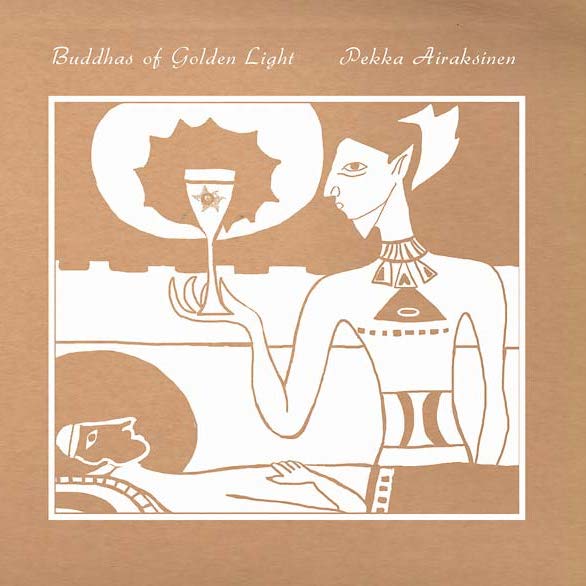Pekka Airaksinen is best known as the founding member of The Sperm, a batshit 1960s Finnish ensemble that combined garbled improv, zoned minimalism, and Artaudian theatrical hijinks in a fashion that one could only pull off back in those halcyon days. They only made one LP, the painfully rare Shh!, but it seems as though the music was never really the thing: neither rock band, jazz band, nor academic avant-garde group, The Sperm were more a precursor to what would become the noise underground, albeit with more of a high-concept performance art bent than many of their offspring. Theirs was a flame which burned white-hot and quick as they traversed the Finnish countryside, violating taboos and obscenity laws, courting legal action, and even managing (as legend has it) to land one of its members in a psychiatric ward for having sex onstage during one of their performances.
Where does one go from there? Apparently, it took Airaksinen a few years to figure out the answer to that (either that, or his doings throughout the 1970s are just sorely under-documented). When he returned to recording in earnest with 1984’s Buddhas Of Golden Light, available again courtesy of the blessed souls at Arc Light Editions, the approach was perhaps not as barn-burningly punkish as The Sperm, but it nonetheless showcases an eccentricity not softened by time.
Buddhas Of Golden Light was Airaksinen’s first in a series of recordings dedicated to each of the 999 Buddhas (to date, he’s covered just over 100). The technology used to make the record, a Roland 808 drum machine and a Yamaha DX7 synthesiser alongside his trusty saxophone, was fairly state of the art for its time, but the resulting sound is a far cry from the hip hop and synthpop for which such gear was already standard. What appears instead are four twisting, sideways churners which sound salvaged from the black box of a Jupiterian shuttle, imposingly dense and strange even in their most goofy moments. Comparisons to contemporaries like The Residents, Smegma, Space Negros, and Caroliner Rainbow would not fall entirely off target, and some moments even recall the outer edges of contemporary jazz fusion, but the combination of shoestring recording techniques and focused solitude lend the album a greater intimacy than most of its ostensible peers, a feeling of loner frenzy which likely would have been diluted by outside input.
Its extremity notwithstanding, if ever there was a time to unleash this album upon an unsuspecting populace, it is now. Its absurd synth tones sound fresh again; its clangorous skronk sounds as much like 2015 as it does its actual vintage. Astute listeners might glom onto bits which seem to predict techniques and sounds utilised by modern astral travellers like Blues Control and Sun Araw, but Airaksinen goes even deeper and weirder. Rarely do his descendents deign to sound so willfully grotty, so smilingly damaged. Though debatably not as doggedly senses-bending as his earlier work (which, by the way, is also overdue for reissue), Buddhas Of Golden Light may be even more individual, and it’s great news that it’s accessible again.
<div class="fb-comments" data-href="http://thequietus.com/articles/18159-pekka-airaksinen-s-buddhas-of-golden-light-review” data-width="550">


